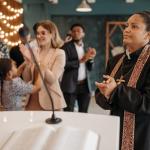A guest post by Elle Dowd, #DecolonizeLutheranism
Diversity as a concept has become harmful. It’s one of those things like “niceness” that is attractive to white people, particularly white liberals, because it sounds really good in theory without demanding any kind of sacrifice from white people. In reality, “diversity” has been used as a tool to deny people of color equal access to power. Goals of diversity give marginalized and dispossessed people crumbs to quiet them, in order to maintain a status quo that exists for the benefit of whiteness at the expense of people of color.
This is nowhere more true than within the Church. Dr. Martin Luther King Jr. said famously that Sunday at 11 o’clock was “most segregated hour in Christian America.” And those of us in mainline churches, such as my own tradition, the Evangelical Lutheran Church in America experience this first hand every week at worship.
Segregation within our church communities is real, and since 3/4 of white people do not have any nonwhite friends this segregation causes us to fail in building relationships with one another.
In community organizing we say that power is the ability to change things and influence people, and we believe that our power resides in our relationships with one another. That is why community organizing puts such emphasis on building relationships, on one on ones, on networking, on meeting people. Each individual has different gifts, different connections, and we can serve each other in different ways. This is what the writer of 1 Corinthians was speaking about in chapter 12, referring to many members and one body. When we work together, we are able to accomplish more, to co-create alongside the Spirit, to bring forth the reign of God in our lives. It is because of the relational and communal nature of God, of Church, of beloved communities throughout history that I do believe that integration of Sunday worship is essential.
And yet integration has often had harmful effects on communities of color and done little to change the status quo in our churches. Even in congregations where people of color are welcome, we often see that the power structure and culture continue to center whiteness.
When we, as white Christians, speak of “diversity” what do we mean? Do we mean a diversity of opinions, of experiences, of expressions? Or do we look for a surface level of “diversity” that requires no sacrifice from people in power?
Does our invitation have conditions?
Do we invite people of color to our church…as if the church belongs to us in the first place? As if we are the gatekeepers?
Do we invite people as long as they sing our hymns, eat our lutefisk, clap on beats 1 and 3 (or…lets be real, they better not clap at all), and pose for smiley pictures to post on our church website’s banner?
And how many people of color are welcome before we start feeling like they are “taking over?” (Research suggests that30% is the tipping point, after that, white people flee).
When we invite people of color to worship alongside us, is our invitation for our benefit or for theirs? Is it out of a need for white saviorism? Is it so that we can ease our white guilt about segregation, to put a few tokens on church committees, to claim that we care about “diversity”?
Do we invite people of color, but continue to make the church a space where “colorblindness” is held as an ideal, where bringing up systemic racism and injustice is seen as “divisive”?
Does our “diversity” change us? Does it make us face our privilege? Does it push us to rally against mass incarceration? Does it insist we disrupt the school to prison pipeline? Does it tug our hearts towards abolishing ICE? Does it lead us to ask questions about reparations?
“Diversity” alone as a goal is harmful for the Church because diversity without an examination of privilege leads to a push for assimilation for communities of color. Diversity without deconstruction of power means, “You can be a part of us…as long as you are just like us.” Diversity without liberation is not diversity at all. It’s about white people putting people of color in their place as tools, as poster children, as objects, as tokens.
Our God is a God who delights in diversity. She created people of all shapes and sizes and colors and genders. And She creates shem beautiful, in Her own image. But our God does not use “diversity” as Her qualifying identifier. Our God does not say, “I am the LORD your God who brought you forth in diversity.” She says over (Psalm 81:10), and over (Exodus 20), and over (Deut. 5:6) “I am the LORD your God who brought you out of slavery.” Our God is a God of Liberation. That’s what God does. She sets people free.
That is what #decolonizeLutheranism is about. It’s about reaching deeper than a goal of a surface level “diversity” and into deep reflection, repentance, and radical reconciliation. It’s about examining and sharing power by relinquishing it, knowing that our power is stolen power anyways, that it was never even ours to give up, that it was never ours to begin with.
This is key in talking about our Lutheran heritage. Lutheranism is not an ethnicity. And our greatest gifts to the world are not our cultural identity markers of things like cuisine and (tired) jokes. Our greatest gifts to the world as Lutherans is our theology. Our recognition of human beings as simultaneously sinner and saint. Our insistence on justification through grace. Our theology of the cross. Our focus on the Gospel. Our history of speaking truth to power. These things transcend Scandinavian or German heritage. They belong to all of God’s people.
Lutheranism is bigger than us, white people, and we are not the boss of it.
To hoard Lutheranism and hold it hostage to white people is sinful. And that is what we are doing when we equate Lutheranism to white culture and refuse any change that necessitates true transformation through sacrifice. Our God is about liberation for everyone. Liberation means that people of color are able to share in the wealth and power of churches and communities, free from fear of micro aggressions from church leaders, free from fear of violence from the state. And liberation also means that white people like me are free from our bondage as oppressors, free from our insatiable need to control.
The ultimate goal of our church communities can’t just be about getting more bodies in the pews of various shades. It has to be a complete reconstructing of what church looks like through the lens of liberation. It means death to our idol of whiteness so that we can make space for rebirth and resurrection into the reign of God.
On a pilgrimage in Philadelphia in 2014, I visited the Episcopal Church of the Advocate. The Church of the Advocate has a long history of standing for liberation. And you can feel it. It is holy ground. Power and righteousness reverberates from its old walls, even as they are falling apart.
The Advocate was the site of the ordination of the Philadelphia 11 and a host of the Black Panther Party. In addition to their ornate neo-gothic architecture, the walls of the Advocate are covered in murals depicting God’s story of Liberation. The murals begin with creation, flows through the Bible, through slavery, through the Civil Rights Movement, and into hope for the full Liberation that is yet to come. And just like Jesus, just like Justice, these murals center people of color. When I visited the Advocate, the Reverend Renee McKenzie, PhD, said to my group, “Whenever you are in a space, I want you to look around and notice who is not there. And ask why that might be. And ask those questions out loud.”
And so the questions are less about “How can we get people of color into OUR churches?” and more about WHY. Why are our churches so segregated? How did they get that way? How is this maintained? Who orchestrated this? Who benefits from it?
The questions are more about things like:
Who has the power? Who is in charge? Who is represented?
What does it look like for people in power to relinquish control? How does this affect our budget? Our building? Our time?
Is our holy art and hymns full of depictions of a whitewashed Christ?
Are our leaders reflective of the communities they serve?
Is our humor full of insider language?
Who is on the margins? How can we center their struggle?
The path to liberation is through reconciliation. Reconciliation demands equity as a prerequisite. And equity demands sacrifice from those of us who currently hold power. This means that things we love, even good things, may have to die, so that better things may live. This means that we have to deal honestly with our bloody history of colonization and with our present realities of racism in our midst. It means we have to be just as honest about creating Dylan Roof as we are proud of creating Bonhoeffer. This means we have to talk about the need for reparations, about mass incarceration, about immigration… and the Church needs to lead the way, with the voices of people of color given the most authority. It means, white church, denying ourselves and emptying ourselves of our privilege, putting our very lives on the line. Like Christ does.
It means we have to #decolonizeLutheranism.
















